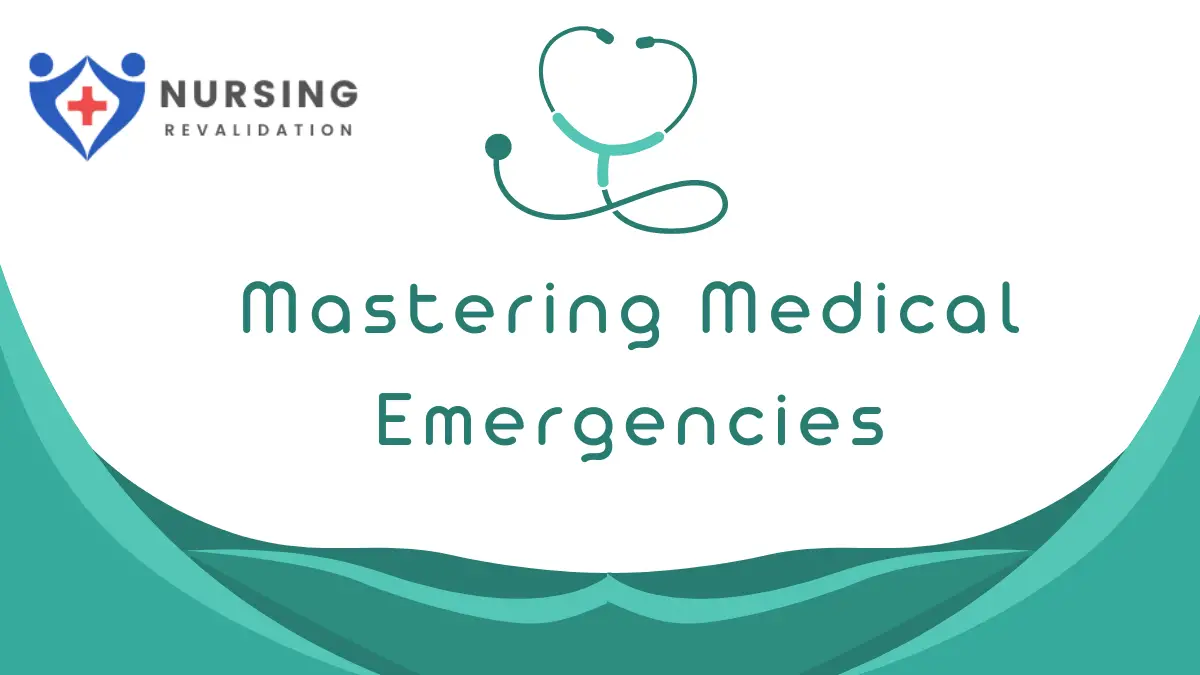Medical emergencies are inevitable in the nursing profession. As frontline healthcare providers, nurses often find themselves at the forefront of critical situations, requiring quick thinking, efficient decision-making, and precise actions. Handling medical emergencies proficiently is not only crucial for patient outcomes but also for maintaining calm amidst chaos. In this comprehensive guide, we delve into essential strategies, protocols, and skills that empower nurses to navigate medical emergencies with confidence and competence.
Table: Common Medical Emergencies and Initial Nursing Interventions
| Medical Emergency | Initial Nursing Interventions |
|---|---|
| Cardiac Arrest | Initiate CPR, Attach Defibrillator, Administer ACLS medications |
| Respiratory Distress | Assess Airway, Administer Oxygen, Monitor Respiratory Status |
| Stroke | Perform Neurological Assessment, Facilitate Rapid Imaging Studies |
| Trauma | Control Hemorrhage, Immobilize Spinal Injuries, Monitor Vital Signs |
| Anaphylaxis | Administer Epinephrine, Monitor Airway, Assess for Allergen Exposure |
Understanding Medical Emergencies:
Medical emergencies encompass a broad spectrum of acute conditions ranging from cardiac arrest and respiratory distress to trauma and neurological crises. Recognizing the signs and symptoms of these emergencies is fundamental for timely intervention. By understanding the pathophysiology and clinical presentation of common medical emergencies, nurses can initiate appropriate interventions promptly.
Key Principles of Emergency Response:
Effective emergency response relies on adhering to key principles that streamline patient care and optimize outcomes. These principles include prioritizing patient safety, maintaining situational awareness, coordinating with interdisciplinary teams, and implementing evidence-based practices. By incorporating these principles into practice, nurses can navigate complex emergencies with efficiency and precision.
Preparedness and Readiness:
Preparation is paramount in mitigating the impact of medical emergencies. Nurses should familiarize themselves with emergency protocols, equipment locations, and institutional policies. Regular training sessions, simulations, and continuing education ensure that nurses remain adept at managing diverse emergency scenarios. Additionally, maintaining personal readiness through self-care practices and stress management techniques enhances resilience in high-pressure situations.
Assessment and Triage:
Comprehensive assessment and triage are foundational steps in managing medical emergencies. Nurses employ systematic approaches such as the ABCDE (Airway, Breathing, Circulation, Disability, Exposure) method to prioritize interventions based on the severity of the patient’s condition. Rapid assessment techniques coupled with effective communication facilitate timely decision-making and resource allocation.
Critical Interventions:
Nurses play a pivotal role in administering critical interventions that stabilize patients in emergent situations. These interventions may include initiating cardiopulmonary resuscitation (CPR), administering life-saving medications, securing airways, and controlling hemorrhage. Mastery of advanced life support techniques equips nurses to address complex emergencies and improve patient outcomes.
Communication and Collaboration:
Effective communication and collaboration are essential components of successful emergency management. Nurses must communicate clearly and concisely with healthcare team members, relay pertinent information, and solicit input when necessary. Interdisciplinary collaboration fosters synergy, enhances resource utilization, and promotes optimal patient care delivery.
Documentation and Debriefing:
Accurate documentation is indispensable for maintaining continuity of care and ensuring accountability in emergency situations. Nurses should meticulously document assessments, interventions, and patient responses using standardized formats. Post-emergency debriefings offer opportunities for reflection, learning, and process improvement, thereby enhancing preparedness for future incidents.
Conclusion:
Mastering medical emergencies is an ongoing journey that requires dedication, preparation, and continual learning. As frontline healthcare providers, nurses possess the skills and expertise necessary to navigate challenging situations and make a meaningful difference in patients’ lives. By adhering to established protocols, fostering interdisciplinary collaboration, and prioritizing patient safety, nurses can excel in managing medical emergencies with confidence and competence.

